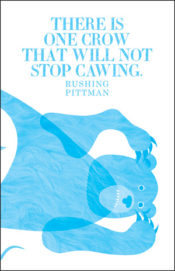
Rushing Pittman
Another New Calligraphy ($16)
by Rebecca Valley
The short, staccato poems that make up Rushing Pittman's There is one crow that will not stop cawing are built on the kind of frank, vulnerable statements about desire and identity not often heard outside a therapist's office. These poems, which have the same weight and clarity as a child's inquiries about death or love, are a startlingly earnest reminder of how little certainty we have as adults, and the ways in which we still think and love like children. Pittman's titles themselves are a kind of poem—in the table of contents the stunning juxtaposition of the lines “I am retaining water, air, lungs / I am trying to become more myself so that I vanish / I have become quiet so the world will not swallow me” are an indicator of both the imagination and the openness that unfolds in the pages beyond.
In a statement about the book, Pittman writes, “I wanted to sit as still as possible and be silent. I counted the weeds. I considered making a garden. I listened to one crow cawing repeatedly. I think that eventually, as this project went on, I became very much like him.” Pittman plays varying roles in this text—at certain moments the poems speak with the desperate, desirous call of the crow who will not stop asking for love, but at other moments the poems are more violent and predatory. “I am consuming all the petals in the garden” ends:
I will kill this year.
Drop it at your door.
Make it your year.
In these lines the narrator has the sincerity of a cat dropping a dead animal at the doorstep. There is a comfort here with our natural, predatory instinct; the cat sees this innocent, dead creature as a gift rather than an atrocity, in the same way that Pittman's poems seem to accept rather than question the suffering that accompanies love.
At their best, the poems of There is one crow that will not stop cawing have the meditative quality of haiku, as in “Inside my mouth there are ten babies”:
It is beautiful out.
It is always beautiful somewhere.
None of us deserve it.
I am a large gem.
I am an entire organism in the open world.
Pittman balances violence and joy in a way that mimics memories of childhood or the cycle of life. These poems scream out for love the way a bird or a frog does—repetitively, hopefully—and simultaneously come to terms with loss, loneliness, confusion, and the childishness we can never discard. In “I have never been married” Pittman balances the thrill of new love with its uncertainty, and embraces the child-like urges we are taught to suppress as adults:
The beautiful woman is coming over for dinner!
I am making Kool-Aid in a big bowl.. . . . . . . . . . . . . . . . . .
There is a great distance between us.
I want to shove her into a pool.
There is one crow that will not stop cawing is an honest book; honest about love, about want, about loneliness, and about the way we intentionally and unintentionally hurt each other. Short and fresh as the spring, these poems offer clearly and unabashedly all the thoughts we are afraid to speak to one another.
